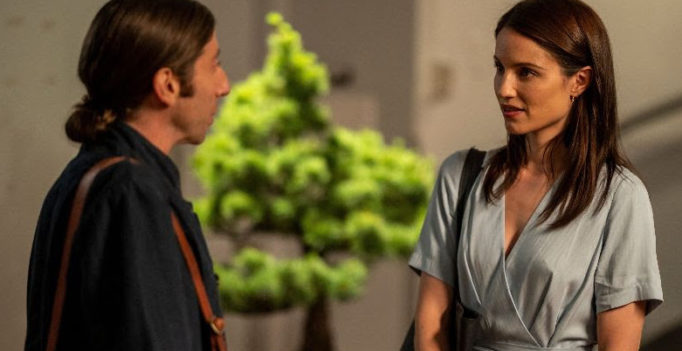With a cast that boasts the likes of Dustin Hoffman, Candice Bergen, and Simon Helberg, As They Made Us is a surprisingly lacklustre start to Mayim Bialik’s directorial career.
Abigail (Dianna Agron of Shiva Baby and TV’s Glee) is a divorced mom of two struggling to support her aging parents and navigate her dysfunctional family. When her father (Hoffman) enters hospice with six months to live, Abigail reconnects with her estranged brother (Helberg) and attempts to kindle a relationship with her handsome landscaper (Justin Chu Cary).
Subdued when it should be silly, and over-the-top during moments of dramatic tension that would be better suited to a restrained approach, As They Made Us consistently misses the tonal mark. The only genuine laughs (though I am not sure they are intentional) come from Abigail’s snarky, self-involved mother (Bergen) who steals every scene she is in. Bergen clearly has fun with the role, and it shows. Though she is meant to be something of a villain, at least in her family’s eyes, flashbacks to Abigail’s childhood paint a picture of a complicated, multi-dimensional woman. It is difficult not to sympathize with her, even as her adult children insist on blaming her for their own failings and their father’s abusive behavior.
The most tender and moving moments of the film are those with Hoffman and Bergen. Though Abigail is, ostensibly, the protagonist, As They Made Us feels more like her parent’s story than hers. Their dynamic is equal parts tender and co-dependent. As characters, they both feel complete and their relationship is believable, even in its messiness and dysfunction.
Abigail, on the other hand, is a hollow shell of a woman who somehow manages to own an entire suburban home on a magazine columnist’s salary. Agron’s performance is passable, but the character is flat and uninteresting. There is nothing that makes her distinct, and she does not change or evolve in any real way over the course of the film. She is a blank slate, a generic stand-in for all thirty-something mothers bearing the weight of family responsibilities and care-giving duties. As They Made Us seems to rely so heavily on the universality and relatability of Abigail’s social position that the filmmakers forgot to make her an individual.
In the third act, after spending the entire film “selflessly” taking care of everyone around her, Abigail is finally called out by her brother who accuses her of being a “martyr”. It is a watershed moment — at least, it has the potential to be one. Unfortunately, we never see how this revelation changes Abigail in any meaningful way. While the end of the film does provide closure by showing us the way that Abigail’s circumstances have changed, we never see the steps that she takes to get there. From beginning to end, As They Made Us keeps the viewer in the dark about Abigail’s inner world. What she wants is never clear.
While the cinematography mirrors the bleakness of Abigail’s life, it makes for an unengaging visual experience. The film’s slow pace and heavy-handed use of medium and long shots creates an enduring sense of monotony and distance that is reflected in the subdued colour pallet.
Even those who are hardcore fans of Bialik and her acting work will likely find As They Made Us tedious, at best. Family dynamics make great fodder for film, but even the most relatable and “universal” human experiences need to be told artfully in order to hold an audience’s attention.
**********
Do You Tweet? Follow These Tweeple:
Shannon Page: @ShannonEvePage





Be the first to comment